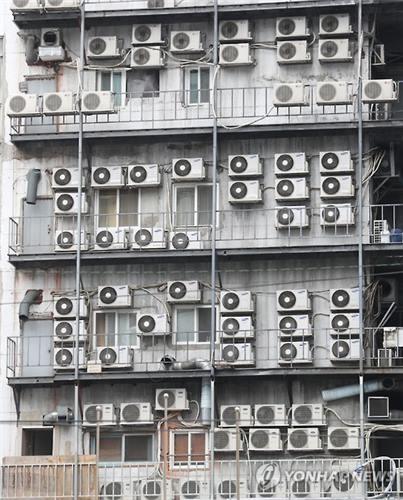Based on the recent news with the death of a 2-year old from a falling window air-conditioner, the city should make the use of window air-conditioners ABOVE the 3rd floor no longer acceptable. There should be a incentive to replace them with a inside floor air-conditioner for all upper floor apartments and offices.
Of course, to put in an "incentive" would mean spending money on a rebate, and the fiscal conservatives on city council would oppose spending money on safety. So they'll just make it a by-law
without any "incentive" to change existing window air-conditioners.
From
link.
From
link.
I think it would be sufficient to prohibit them where a balcony is not present (the balcony can catch one w/o issue should it fall that height).
That said, some landlords have long permitted window a/c only if their staff/contractors installed it.(typically bolting in into the window frame).
There are lots of practical solutions to something such as this.
Portable a/c does have a couple of drawbacks, its generally less efficient and more power intensive than window units.
That can be a problem for low-income renters who have sub-metered power.
Also, the majority of rental units in Toronto only have 60amp electrical power, even in 3-brdm units. That means a large draw compressor can easily blow a fuse or trip a breaker.
To address issues such as these:
1) A code requirement to get rid of fuses in favour of breakers would greatly reduce fire hazard (people often put 20amp or even 30amp fuses on wires rated for 15amp)
This could be a requirement for all turnover units (the cost is easily recovered by higher rent); with a deadline for all units of 2030.
2) Wherever technically feasible (and it is most larger buildings) power to each unit should be upgraded to at least 100amp.
3) Toronto/Ontario must add a maximum temperature to units, like we do with a the minimum that requires heat in the winter. This would make it incumbent on landlord's to install a/c. Clearly an extended phase-in is required; and financial mitigation may be required in some buildings.
4) Finally, we don't want to just explode energy use; many older buildings have asphalt parking lots with little or no shade which act as heat sinks and inflate daytime and more notably nighttime temperatures.
Requiring these to be phased-out in favour of light-coloured, permeable, interlocking pavers, with shade trees which provide at least 70% shade coverage of the lot would significantly reduce summer heat-up of buildings and allow lower power usage and a/c requirements.







